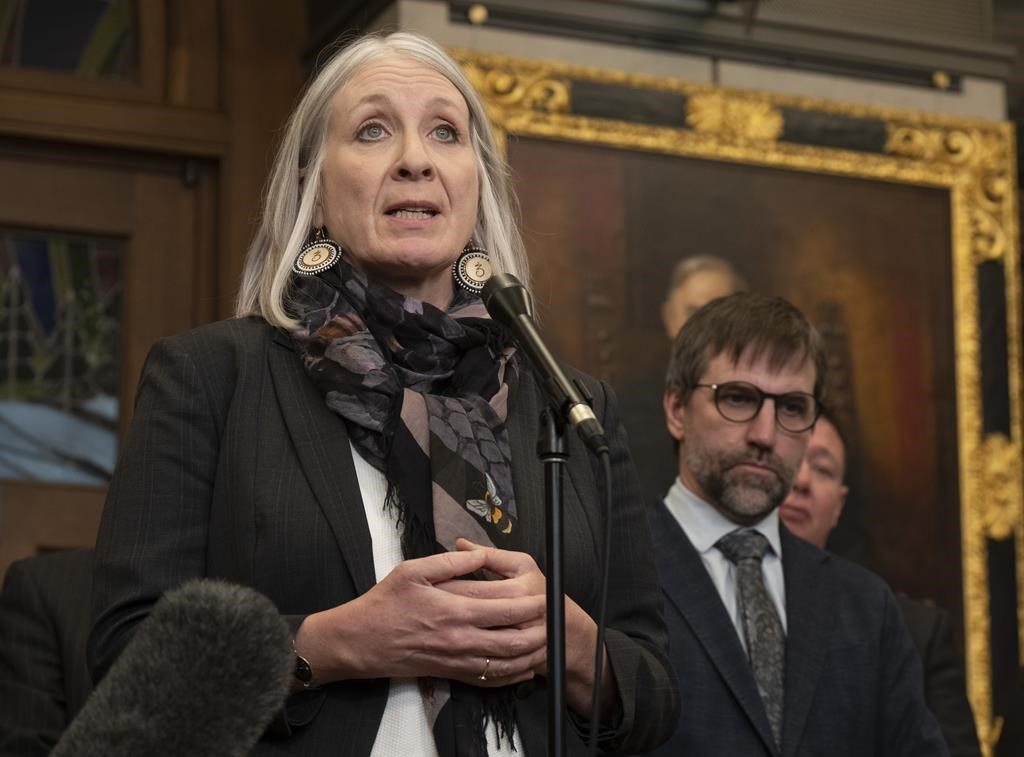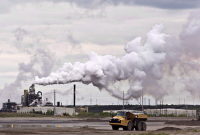Support strong Canadian climate journalism for 2025
Federal Environment Minister Steven Guilbeault has repeated his call for a stronger federal presence when it comes to environmental monitoring and communications in the oilsands, following a pair of wastewater releases from Imperial Oil's Kearl mine in Alberta.
"The reason the federal government is proposing to change the way we do monitoring and communications on the tailings ponds is that in this instance (the current system) didn't work," he said Monday.
Guilbeault added Ottawa is considering recommendations from the Mikisew Cree First Nation, which include reforms to environmental monitoring, currently conducted by industry.
"We agree with them. We need a better monitoring system."
The first release was spotted and reported in May as discoloured water near a tailings pond. It was found to be tailings seepage but no further updates were provided to area First Nations until February, when it was disclosed to the public and federal and provincial environment ministers along with a second release of 5.3 million litres of tailings.
That's not acceptable, Guilbeault said.
"The system we have in place is failing."
Guilbeault repeated his plan for a new body with federal, provincial and First Nation members that would meet regularly to share information, especially on environmental emergencies like the Kearl releases.
It would also discuss cleaning up tailings releases, how to keep the vast toxic ponds contained and long-term solutions for them — proposals contained in a letter Guilbeault sent last week to his provincial counterpart, Sonya Savage.
"We would find processes where everyone gets the information in a timely, transparent and accurate manner," he said. "No one has to find out months later something has been going on."
Guilbeault said he also wants the body to look at reform of water monitoring in the area.
"Many would feel relieved if monitoring was done in an independent manner."
Billy-Joe Tuccaro, chief of the Mikisew Cree First Nation, said Guilbeault promised as much in a meeting.
"They promised to increase the monitoring program," he said.
Alberta's current $50-million, industry-funded monitoring program hasn't had a budget increase in a decade. The program has been criticized by its own scientists for being good at collecting data but bad at doing anything with it.
In public statements, Savage has agreed to the need to look at communication between the two levels of government as well as long-term solutions to oilsands tailings, which cover in total 300 square kilometres and hold 1.4 trillion litres of toxic tailings.
Guilbeault said Savage seems open to dialogue.
Meanwhile, Tuccaro said drinking water for the community of Fort Chipewyan, promised by Ottawa, has started to arrive. The water is being shared with all First Nations potentially affected by the spill, he said.
But Tuccaro said Ottawa has yet to approve his band's long-standing request for a long-term community health study in the community of Fort Chipewyan.
"They haven't committed to a community health study," he said. "That's a big one."
Tuccaro said comments from Imperial and the provincial government that there have been no impacts to water or wildlife do not reassure his community.
"They couldn't even tell us (the seepage) is being contained," he said. "We want it 100 per cent contained."
Guilbeault said officials from Imperial Oil and the Alberta Energy Regulator will be invited to appear before the House of Commons environment and sustainable development committee.
This report by The Canadian Press was first published March 20, 2023.





Comments
The entire oil and gas industry should be more closely and independently monitored, as many of their actions threaten water and air, concerns for the whole country.
Thank you Minister Guilbeault.
In the long run, I have never understood why fossil fuel operations and other massive polluters are not required to clean up their messes, from their own resources. Create a dedicated, untouchable trust fund at the very beginning. Use it for that purpose.
Even the local gas station in my little rural community is required to remove under-ground tanks, and clean up the mess, before they can walk away.
Why are the mega-polluters and environmental destroyers not required to do the same?
In Ontario, we still have Grassy Narrows. Water and soil poisoned by a mill, decades and decades ago. Minimata disease in the community. Water and soil STILL not in the condition it was before these villains walked in, crapped on the land and water, and walked away. Provincial and federal governments let that happen.
The only restitution since has been bandaid programs, to deal with the EFFECTS of this horror.
Not good enough, by far. Bring back clean water, and clean soil, to this community.
This is an example of the complete government capture by fossil fuel companies. We know without a doubt that taxpayers will be left paying to clean up the tailings ponds, that it won't even be possible, and that First Nations will suffer. Only in the most egregious and obvious instances do governments react at all, and then wholly inadequately.